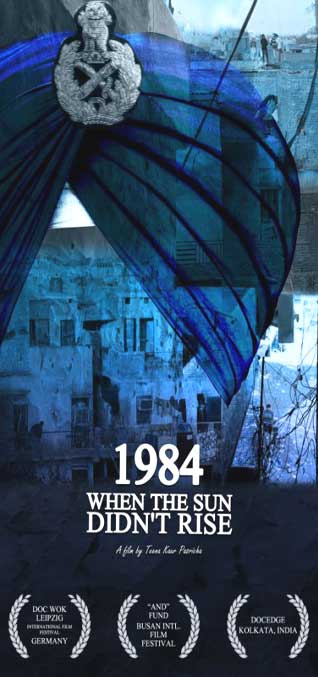Film/Stage
Teenaa Kaur Pasricha’s Latest Documentary:
1984 - When the Sun Didn’t Rise
Jis Din Suraj Ugya Nahi
R K ROSHNI, SUHANI SINGH, et al
Teenaa Kaur Pasricha has captured on film the harrowing experiences of women who survived the genocide of the Sikh community in New Delhi in 1984. By focusing on feminine experiences, this film has managed to give space to the most exploited and least heard voices, of the brave women who lost their husbands and sons in the tumult.
The film was partially funded by the Busan International Film Festival’s Asian Network and Documentary Fund, and The Leipiz International Festival for Documentary and Animated Films Fellowship.
At the beginning of ‘1984 - When the Sun Didn’t Rise’, Teenaa Kaur explains that she inherited anger from her mother who is haunted by the memory of Teenaa’s uncle being dragged out of a train and his hair being cut in the Delhi pogrom of 1984. He lived, but the trauma and loss of his identity sent him into a depression.
When a grown-up Teenaa later struggled to make a life in Mumbai, she could not but wonder how Sikh women who had lost their husbands and family in the Delhi pogrom picked up the pieces of their lives.
“Many were barely literate, their husbands dead, their savings gone, and after all that trauma, they had to learn to survive.”
The documentary was screened at the DC Asian Pacific American Film Festival in March, 2017, and the Indian Documentary and Short Film Festival in Kerala in June, 2017.
Teenaa did research about the 1984 massacres that eventually spread to all regions and corners of India, and the results initially found expression in a feature film screenplay that unfortunately didn’t get made because of a lack of funds.
She says that but for ‘Amu’, a film by Shonali Bose, and some amateur films made by members of the Sikh community and uploaded on YouTube, the 1984 tragedy has been largely ignored in the visual format.
“People had started forgetting about what happened. Only a few members of the Sikh community remembered it. It was painful, and it was convenient to forget it and move on.”
Teenaa then started working on the documentary.
“I wanted the genocide to be remembered in the history of India so that violence on the basis of identity does not happen again.”
Getting the women to open up was not easy.
“I wanted to connect with them, get them to trust me so that I could tell their stories.”
Talking to the widows made her realise that they were very strong women who were capable of living with their memories and still take care of their families. She came to understand that the widows had only other widows for company. They had got some material help, but rarely any empathy.
Teenaa also found herself being drawn into their accounts.
“I found it difficult to separate myself from them. I had to pull myself out of their stories and become a filmmaker. This took a long time.”
The film-maker reveals how it took almost two years to document one widow’s story.
“Every time, she talked about the 1984 massacres, she would fall ill, and her family was against it. I would wait outside her house and wait for her to be ready - emotionally and mentally - to talk to me. And I could understand because it was disturbing even for me to hear the accounts.”
These vivid and searing accounts form the core of Teenaa’s documentary. The documentary also dwells on the consequences of the government orchestrated mob violence, even on youth and young children who still find it difficult to negotiate their memories of what happened.
Teenaa is currently involved in working on environment issues for a national TV Show. Amongst her prominent films is the one on the theme of environment-friendly crafts; it was aired on National Geographic and Fox History channels.
Her debut documentary, 'Hola! The Mighty Colors' was screened at Sikh International Film Festival, New York. The documentary film, ‘What about our Men?’ was selected for DOCEDGE, 2012.
* * * * *
Teenaa Kaur is currently looking for people who can help her screen ‘1984: When the Sun Didn’t Rise’ in the US and Canada. She can be reached by CLICKING here.
September 20, 2017
Conversation about this article
1: Harinder Singh (Pune, India), September 29, 2017, 8:28 PM.
1984 was an conspiracy between Indira Gandhi's India and Margaret Thatcher's Britian to deSikhify India by a genocide. The greed of wealth and power was the direct cause of the pogroms.



